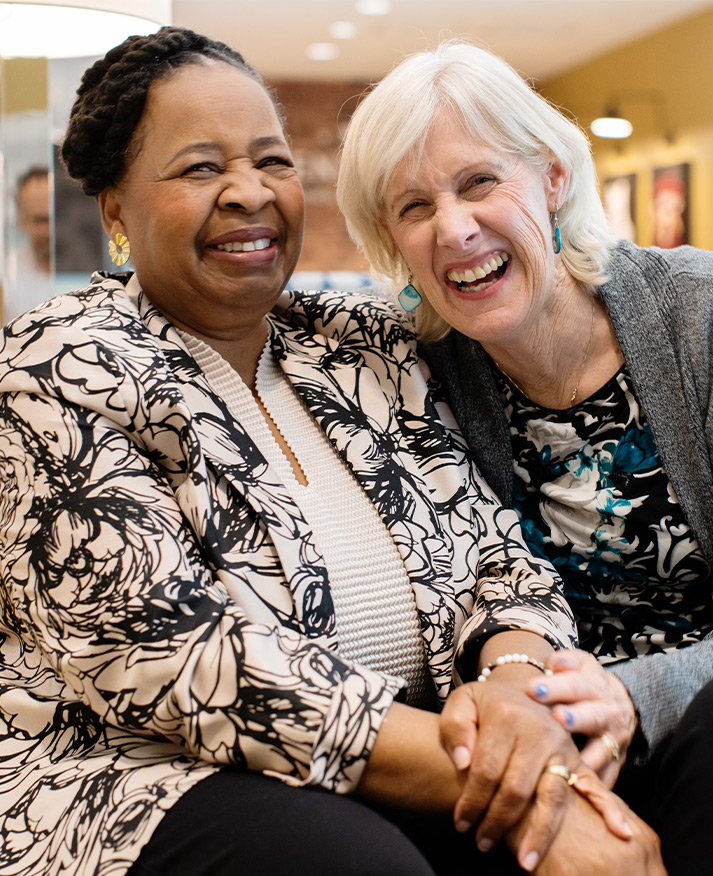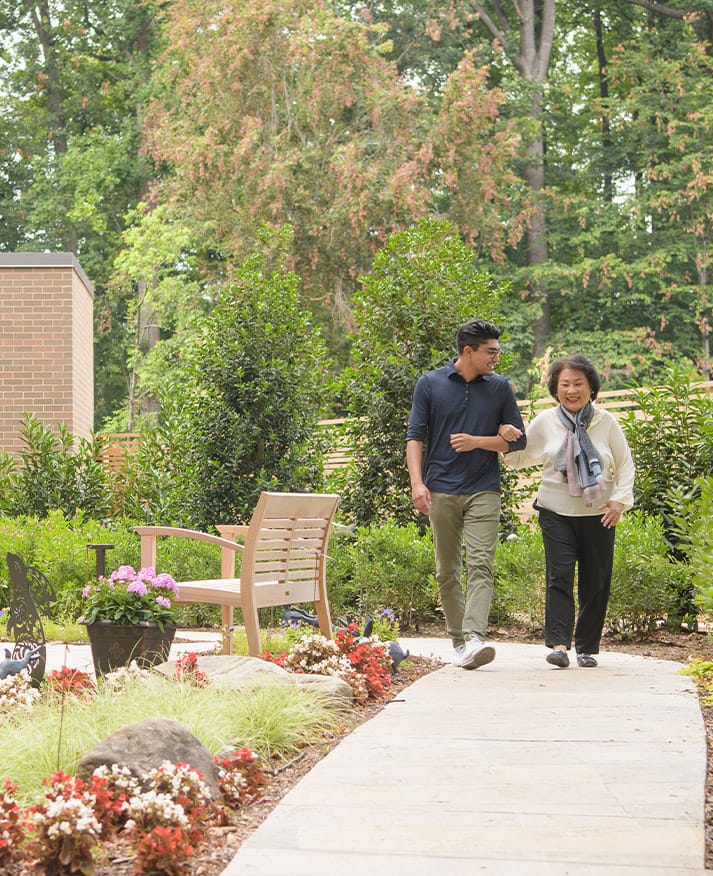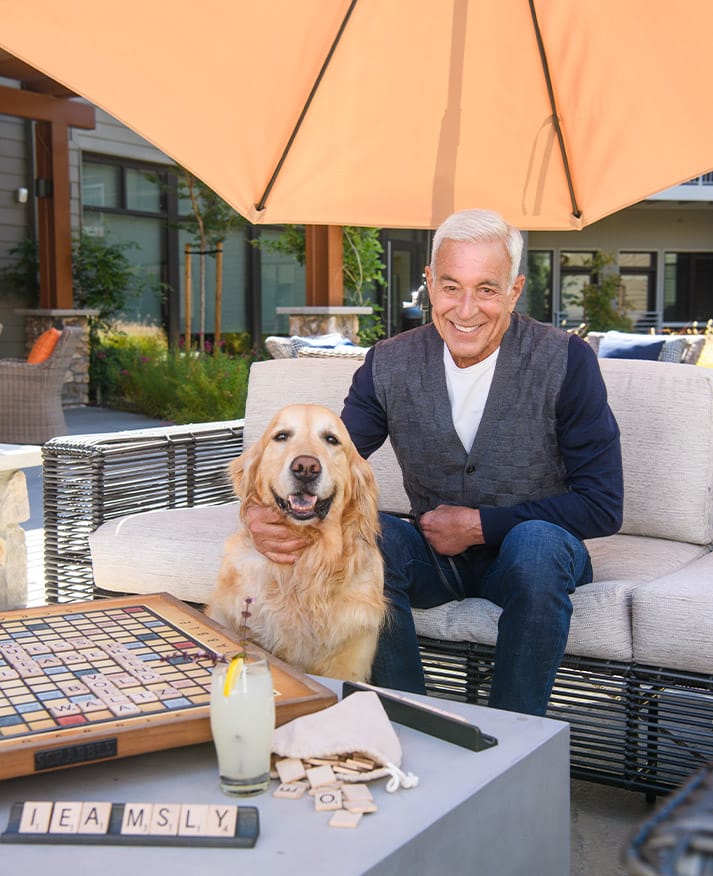The Importance of Socializing
A quiet truth: Loneliness in older adults is more common than we think.
As we grow older, the simple act of staying socially connected becomes harder, but also more critical than ever. Many older adults lose close friends, spouses, or daily routines that once anchored their social life. Driving becomes more difficult. Children move away. And without noticing, days become quieter, and the world feels smaller.
But here’s the good news: the desire to connect, share stories, laugh with others, and feel a sense of purpose never fades. In fact, it only becomes more vital. That’s why socialization isn’t just a “nice to have” in older adulthood; it’s essential.
Senior living communities, like Watermark communities, are built around that truth. From the design of the buildings to the daily activities, everything is centered around one goal: meaningful connection. In this guide, we’ll explore the many ways socializing enriches health, happiness, and longevity, and how families can help their loved ones thrive in a community built for engagement.
Why Social Connection Is a Health Essential, Not a Luxury
You’ve likely heard that staying socially active is “good for you,” but what does that actually mean?
Socialization supports every major aspect of health — emotional, mental, cognitive, and physical. When older adults engage with others, whether through conversation, group outings, or shared hobbies, it’s like giving their mind and body a daily dose of wellness.
Emotional Benefits of Social Connection
One of the most immediate and powerful benefits of socialization is how it uplifts mood and enhances emotional well-being. Feeling isolated can lead to sadness, boredom, or even depression. On the flip side, something as simple as a daily conversation can improve confidence and ease feelings of anxiety.
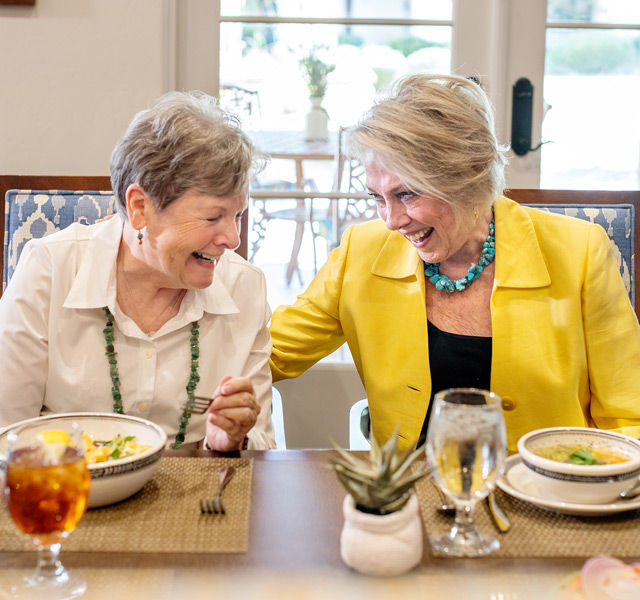
Socializing helps older adults:
- Feel heard, seen, and valued;
- Share their stories and life experiences;
- Laugh and enjoy the present moment; and
- Build a sense of belonging and purpose.
For many residents at a Watermark community, it’s the friendships they form that bring unexpected joy to their days. Sometimes, a shared cup of coffee or a partner for bridge can make all the difference.
Mental Health and Resilience
A socially engaged life supports emotional resilience, especially during life’s more challenging moments. Transitions such as moving, the loss of a spouse, or changes in health can be easier to navigate with a strong support system.
Communities that prioritize peer connection and offer meaningful programming create spaces where residents are reminded they’re never alone, no matter what they’re facing.
The Brain Loves Company: Cognitive Benefits of Social Engagement
We often think of puzzles and brain games as the keys to staying mentally sharp, but research shows that regular conversation and social activity are just as powerful — if not more so.
Social Interaction Is Cognitive Exercise
Every time someone joins a group conversation, remembers a neighbor’s name, tells a story, or shares a joke, they’re activating multiple parts of the brain: memory, language, emotion, attention, and more.
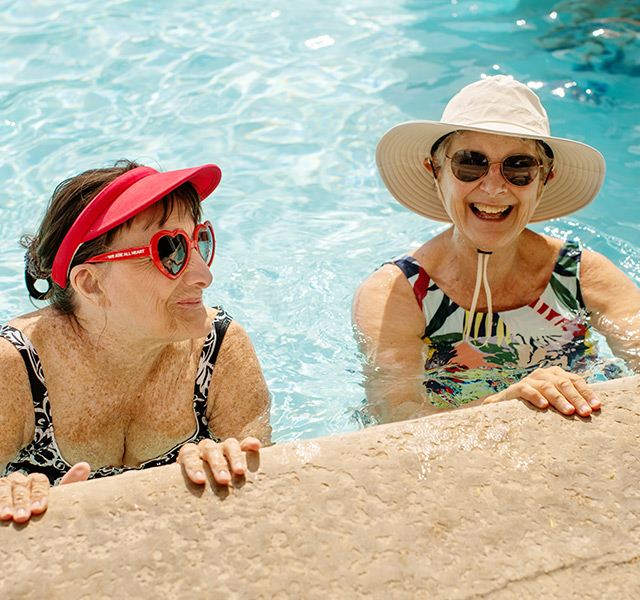
In fact, studies have found that older adults with strong social connections experience:
- Slower cognitive decline,
- Lower risk of developing Alzheimer’s disease or dementia,
- Better memory recall, and
- Improved problem-solving skills.
According to a report published in the American Journal of the International Neuropsychological Society, seniors who maintained strong social ties had a 70% reduced risk of cognitive decline compared to those who were more isolated.
Put simply: meaningful interactions keep the mind sharp and engaged.
Learning Together Encourages Mental Growth
Senior living communities that offer educational and creative programming provide opportunities for residents to grow their minds and spark curiosity. At Watermark communities, for example, Watermark University classes allow residents to dive into new hobbies, explore history, and even teach courses themselves. When learning is shared with others, it becomes more memorable and much more fun.
Stronger Together: Social Connection and Physical Health
Beyond the brain, social activity also improves physical well-being. Staying socially active can lead to more movement, healthier habits, and better outcomes across nearly every area of health.
Here’s how:
Physical Health Benefits of Social Engagement
Staying connected does more than lift the spirit. It can strengthen the body, too. When older adults feel socially supported and engaged, they’re more likely to participate in healthy routines, stay active, and bounce back more quickly from illness or injury. The physical benefits are both wide-ranging and impactful:
- Lower blood pressure,
- Stronger immune function,
- Improved mobility and balance,
- Better sleep,
- Reduced risk of heart disease and stroke, and
- Faster recovery from illness or surgery.
A study published in PLOS Medicine found that strong social relationships increase the likelihood of survival by 50%, comparable to quitting smoking or maintaining a healthy weight.
When older adults feel connected and supported, they’re more likely to take part in fitness classes, group walks, and wellness activities, and those consistent efforts can make a profound difference in long-term health.
The Ripple Effect: Socialization Supports Purpose and Joy
Connection is about more than just staving off loneliness. It’s about helping older adults rediscover what brings them joy. Having a full calendar of enriching, engaging experiences gives structure and excitement to daily life.
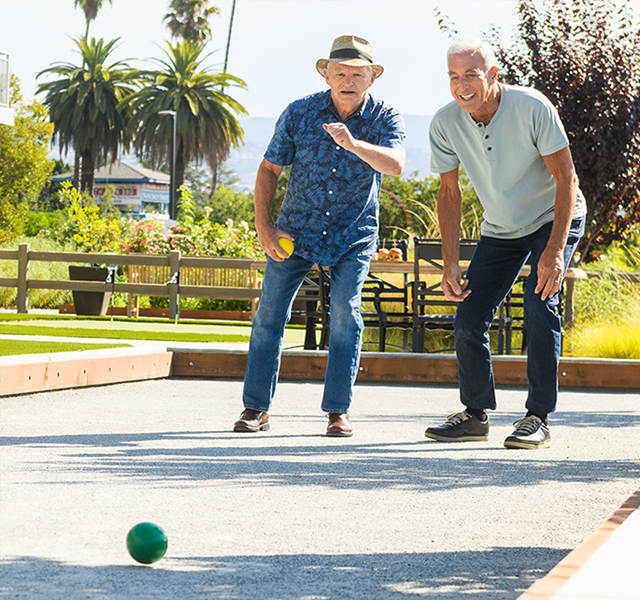
When residents get involved in their communities, they often find:
- Renewed motivation to get up and greet the day.
- A stronger sense of identity beyond medical appointments or caregiving routines.
- Opportunities to give back, mentor others, or take on leadership roles.
- Moments of spontaneity, joy, and laughter that reignite happiness.
Whether it’s joining a poetry group, leading a trivia night, organizing a garden club, or cheering on friends at community events, residents often say they feel like they “got their spark back.”
The First Step: Overcoming the Barriers to Connection
Even when opportunities for connection are abundant, many older adults hesitate to engage. Fear of being the “new person,” concern about physical limitations, or even the assumption that “it’s too late” to make new friends can get in the way.
As families and caregivers, it helps to validate those feelings while offering reassurance. Let your loved one know:
- They don’t have to “fit in” right away — just showing up is enough.
- Every community has people who were once new too.
- Socializing doesn’t mean being extroverted; even quiet, one-on-one connections matter.
Sometimes, all it takes is the right invitation or a gentle nudge to help someone rediscover the joys of companionship.
Technology as a Bridge, Not a Barrier
When distance, mobility, or health challenges make in-person visits less frequent, technology can offer a powerful way to stay connected.
Teach or assist your loved one with:
- Video calling platforms like Zoom or FaceTime,
- Messaging apps to keep in touch with grandkids or family,
- Digital photo frames that update with new family pictures, and
- Online classes or virtual book clubs.
Many senior living communities offer tech support or classes to help residents embrace these tools. When used with confidence, technology becomes a bridge to the people and experiences they care about most.
Conversation Starters That Spark Connection
It’s easy to forget how meaningful an everyday conversation can be. For families, associates, and fellow residents, having a few great conversation starters on hand can make a world of difference.
Here are a few ideas to spark connection:
- “What’s something you’ve always loved doing?”
- “If you could visit anywhere in the world again, where would you go?”
- “What’s a memory that always makes you smile?”
- “Did you have a favorite job or teacher growing up?”
- “What music brings you back to your younger days?”
These questions help older adults feel seen and valued for the unique life stories they carry, and often lead to wonderful shared moments.
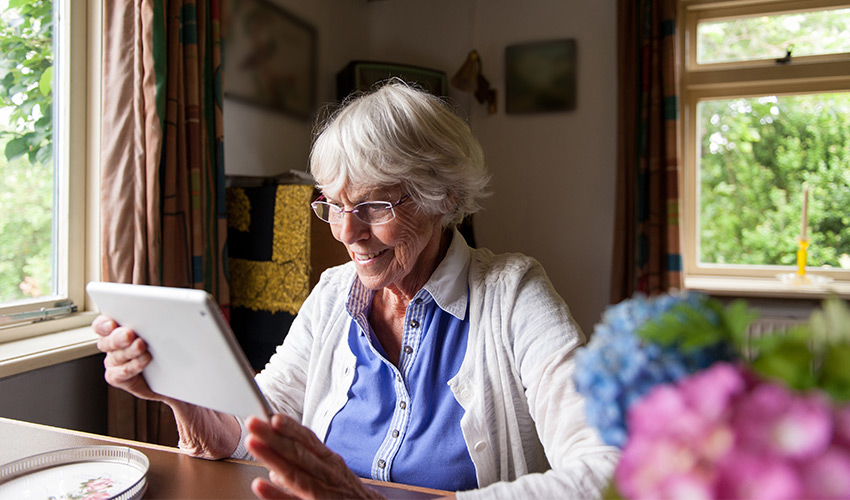
How Watermark Communities Foster Connection
At Watermark, the belief is simple: connection is the foundation of a healthy, happy life. That’s why every element of our communities is designed to bring people together.
Intentional Design That Encourages Interaction
From cozy nooks perfect for chatting to vibrant common areas built for larger events, our spaces naturally invite engagement. Even outdoor paths, courtyards, and dining venues are set up to make connections easy and natural.
Signature Programs That Inspire Belonging
These aren’t just activities; they’re opportunities to build meaningful relationships. Residents have access to a wide array of experiences that foster both social and personal growth, including:
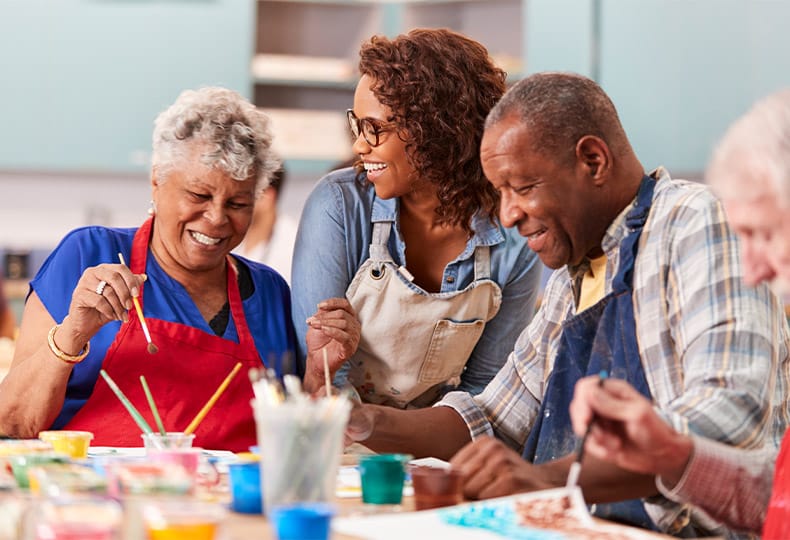
Watermark University
Peer-led and expert-led courses on art, history, music, languages, cooking, and more.

Extraordinary Outings
Curated group adventures to museums, concerts, restaurants, and nature excursions.

Fitness and Wellness Classes
Group yoga, dance, aqua aerobics, and more, all tailored for all ability levels.
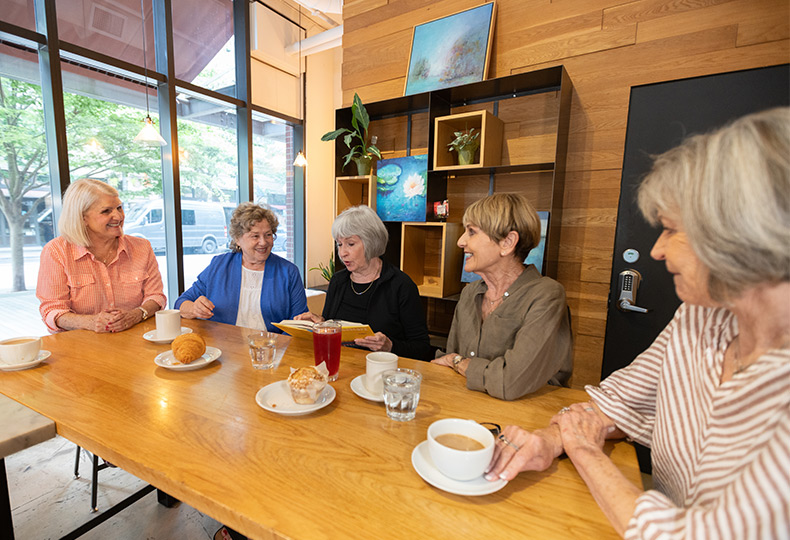
Clubs and Resident Committees
Opportunities to shape community life, give feedback, and co-create experiences.
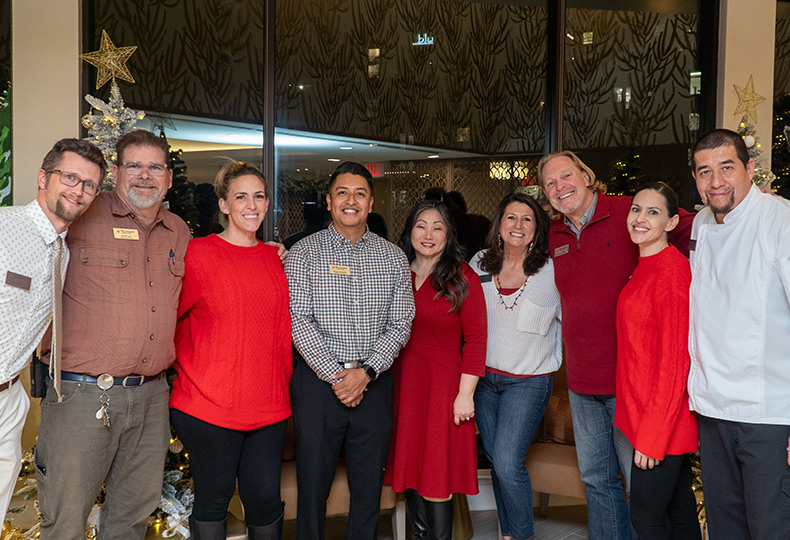
Intergenerational Programs
Story hours, performances, and volunteer programs that bridge generations and spark joy.
For Families: How You Can Support Social Engagement
Your role in helping your loved one stay socially connected doesn’t end after move-in. Here’s how you can support their journey:
Encourage Participation Without Pressure
It’s common for new residents to hesitate at first. Instead of pushing, gently encourage them to try one new thing each week, even something small like attending a coffee chat or joining a painting class.
Join in When Possible
If your schedule allows, join your loved one for a community event or class. Shared experiences help strengthen bonds and show them that the community is something you also enjoy being part of.
Celebrate the Wins
Whether they made a new friend or tried something new, celebrate those moments. Your positive reinforcement matters.
Ask About Their Social Calendar
Instead of only focusing on doctor visits or meals, ask things like:
- “Have you tried any new classes lately?”
- “Who do you usually sit with at dinner?”
- “Is there anyone you’ve really enjoyed talking with?”
These questions help them reflect on positive social experiences.
What If My Loved One Resists Socializing?
If you’re worried that your parent or partner might not want to join in, you’re not alone. It’s a common concern among families, especially when a loved one is shy, grieving, or simply hesitant about change.
But here’s the good news: meaningful connection doesn’t happen overnight, and that’s okay. The goal isn’t to force participation; it’s to create a warm, welcoming environment where curiosity can grow naturally.
At Watermark communities, residents are invited, never pressured, to engage. Associates take the time to get to know each individual: their interests, comfort zones, and rhythms. If someone prefers quiet mornings or one-on-one chats instead of group events, that’s not only accepted — it’s honored.
Often, the shift happens gradually. A resident might start by watching a watercolor class, then ask to try it the following week. Or they might attend a movie night “just to see” and leave with a new friend. For many, the initial hesitation fades as they realize they’re not alone in feeling cautious, and that genuine community is waiting just outside their door.
If your loved one is resisting social opportunities, the most powerful thing you can offer is encouragement. Share in the journey with them. Ask about their day, celebrate small wins, and trust that connection, like trust, grows with time.
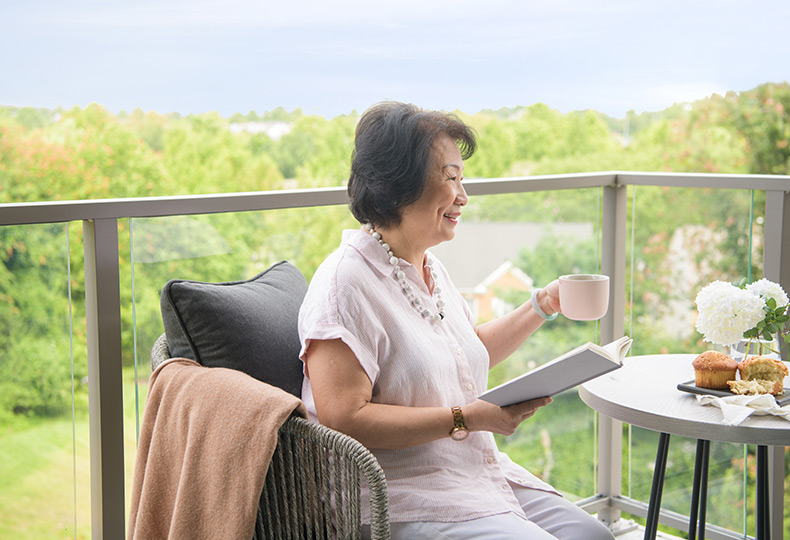
FAQs About Socialization and Senior Living
Here’s a helpful section for families who may be exploring this topic for the first time.
Most do, but the quality and variety can vary widely. Look for communities that go beyond just filling a calendar — those that offer resident-led clubs, personalized experiences, and a culture that encourages participation. At Watermark communities, programs are designed with intention, often based on resident feedback and interests.
Yes. Studies consistently show that regular social interaction can help slow cognitive decline, improve memory, and even reduce the risk of dementia. Shared activities also help stimulate curiosity and mental flexibility.
That’s completely normal. Many older adults feel unsure at first. Look for a senior living community that offers a range of options, from quiet social settings like afternoon tea or book clubs to larger events. Start small and build confidence over time.
That’s perfectly okay. The goal is meaningful connection, not quantity. One-on-one visits with family, chats with neighbors, or even connecting with associates can offer huge emotional benefits.
Try asking open-ended questions and listening to what lights them up. Encourage, don’t push. Offer to attend events together when possible. And always celebrate their social “wins,” no matter how small.
Small Moments, Big Impact: The Power of Everyday Interactions
Sometimes, it’s not the big events that shape our lives. It’s the familiar, everyday moments that help us feel seen, heard, and valued.
In senior living communities, these moments happen effortlessly. A cheerful “good morning” from a neighbor. A shared laugh during chair yoga. A spontaneous conversation during a game of dominoes. These simple, genuine connections bring comfort, lift spirits, and remind residents they belong to something bigger than themselves.
Even those who don’t consider themselves naturally social often benefit just from being surrounded by community. The presence of others, whether it’s a friendly wave or a quiet companion at the puzzle table, can offer a sense of emotional security that’s difficult to replicate when living alone.
At Watermark, we intentionally design our spaces and programs to spark these meaningful connections. From welcoming lounges and shared dining experiences to purposefully crafted activities, everything we do supports the kind of everyday engagement that leads to deeper relationships and greater fulfillment.
Because at the heart of it all, socialization isn’t just about being busy—it’s about belonging.
A connected life is a longer, healthier, and more joyful one. And it’s never too late to start.
If your loved one is considering senior living, or if you’re simply exploring what could make this chapter of life more fulfilling, remember something. It’s not just about amenities or floor plans. It’s about feeling known. It’s about laughter at lunch, stories over coffee, and quiet companionship on an afternoon walk.
It’s about living life — together.
